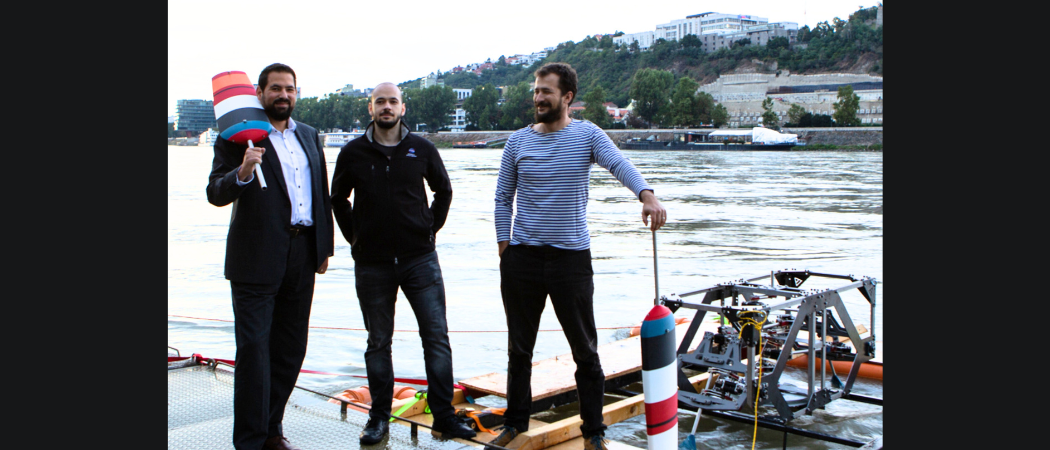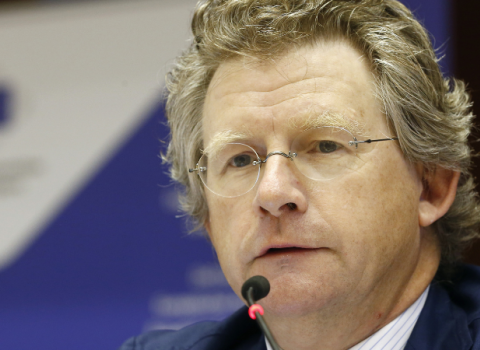SynergistEIC supports start-ups to give them a better chance of success in the EIC Accelerator. But high demand means getting selected for the scheme is almost as competitive as the EIC Accelerator itself

The SPEARHydro team testing their prototype on the Danube. SynergistEIC aims to help them and other widening start-ups to success in the EIC Accelerator
With very few start-ups from Widening countries winning funds from the lucrative European Innovation Council (EIC) Accelerator, the EIC has set up SynergistEIC to help companies make successful bids.
The grant and training programme is one of a series of EIC programmes designed to support the EU’s New European Innovation Agenda. SynergistEIC’s first open call attracted more than twice the target number of applications, and of 192 bids submitted, 135 were eligible, making demand for the 15 available places almost as competitive as the EIC Accelerator itself.
“Having so many applications was a surprise for us, but it shows that there is really a need for this kind of programme,” said Oriane Georges from start-up network F6S, which organised the call. The Spherik Accelerator in Cluj-Napoca, Romania leads the project consortium, with the G-Force and FastTrack Action venture funds also providing acceleration services.
With up to €50,000 for each participant, SynergistEIC is set apart from local offerings for start-ups, said Dimitri Ionescu, chief executive of Lithuanian start-up LightMirror, one of the successful applicants. “There are a lot of accelerator programmes in the Baltic countries, but they don’t give much money. It’s just mentoring and some paid trips. You can get as much mentoring as you want, but if you don’t have the minimum amount of money to develop the product and protect it, these programmes just slow you down and don’t give much in return,” he said.
SynergistEIC’s focus on climate tech, clean tech, the circular economy and agri-food, has drawn applications from the Widening countries. “We’ve found that there are very few programmes in central and east European region that offer funding for visionary hardware companies like ours,” said Martin Sichman, chief executive of Slovakian start-up SPEARhydro, which is developing a hydropower system for rivers. “And funding schemes are mostly focused on digital tools and software.”
But the project’s mandate to support start-ups from the Widening countries has not translated into a windfall for those in central and eastern Europe. They are in the minority, while start-ups from Spain, Greece and Turkey together account for seven of the 15 recruits.
According to the organisers, this is partly because SynergistEIC had to take a range of factors into consideration, not least the overall scoring, with start-ups from associated countries putting in very strong bids. Meeting a 25% target for companies with women on the top team also shaped the final selection.
Potential to succeed
The SynergistEIC accelerator has two tracks. One comprises 10 start-ups that have not applied to the EIC Accelerator, but are judged to have the potential to succeed. The winners were Traken from Serbia; Zelus and Along Route from Greece’ Smart Farm Robotix from Bulgaria; Roboticssa and PlanetAI Space from Spain; Innorma from Turkey; and Regrowth from Italy. The cohort is completed with HODLNG and Agrovisio, companies registered in Estonia but which originated in France and Turkey respectively.
In the second track are five start-ups that are in the process of applying to the EIC Accelerator, or which have tried and failed in previous rounds. These are World from Space from Czechia; Konree Innovation from Ireland; Cedrion from Spain; LightMirror from Lithuania; and SPEARHydro from Slovakia.
“These start-ups are of very diverse maturity levels, both in terms of technology and market perspective, but they all want to make an impact,” said Giuseppe Mele from FastTrack Action.
The non-EIC track starts with three-months of mentoring, workshops on issues such as fundraising and company development, and advisory services. The next three months then focus on investment and investor matchmaking, particularly finding lead investors.
Companies on the EIC track are generally more mature and need more individual attention. “Their expertise in the domain is well-developed, but they are in need of funding, and that is a major challenge,” said Mircea Vadan, president of the Spherik Accelerator, which leads on the EIC track.
SPEARHydro has passed stage one of the EIC Accelerator application process and is preparing a stage two proposal for submission in 2024. Participation in SynergistEIC supports that process, and is also a way of moving the company forward more broadly. “After the six-month journey we are confident we will make significant progress from the product, business, partnerships and intellectual property standpoints,” said Sichman.
The company, founded in 2016 as Archee, developed its floating hydropower system in collaboration with research centres in Germany, Portugal and the Slovak Academy of Sciences. It has tested a prototype in the Danube at Bratislava, and is planning a full-scale pilot project.
“We’ve been funded mainly by founders' money and through grants and awards,” said Sichman. “However, we have a network of interested VCs that are watching the development of our technology closely, and five clients in Bratislava covering our main segments, which are port operators, real estate developers and private vessel owners.”
SynergistEIC will help the company refine its pitch and reach out to investors and potential partners in the energy sector, while the funding it offers will support further technology development. “We are currently working on improving the technical blueprints and drafting a new patent application, while adjusting our business model to reflect the improved design,” Sichman said.
LightMirror too, has successfully completed stage one of the EIC Accelerator process, and is preparing for stage two. Its concept is remarkably simple: inclined reflective panels installed on the roof-edge of one building are used to redirect sunlight towards the face of another. The result is passive solar heating and increased natural light for buildings that are normally in shadow, reducing energy bills.
The technology is ready for the market, and a first installation is under way in Poland. “The technology can be developed further, of course, but we have more than the minimum viable product,” said Ionescu, a civil engineer from France who co-founded the company in December 2021 with Aleksandra Bulanova from Ukraine.
Joining SynergistEIC will enable LightMirror to focus on business development, hone the business model and marketing strategy, apply for a patent and prepare to raise more funds. “The programme is not only to prepare us for applying for the EIC Accelerator, but more generally to help us pitch to venture capital companies,” Ionescu said.
Robotic weeding
Smart Farm Robotix from Bulgaria applied for SynergistEIC and the EIC Accelerator at the same time, and was successful in both. “By the time we were approved for SynergistEIC, we had been told we had passed the first stage for the EIC Accelerator,” said Rossen Kolev, founder and chief executive of the company. “During the project we’ve already submitted our stage two application, and with the help of the SynergistEIC mentors we’ve been able to improve our proposal,” Kolev said.
The company was founded in 2021 to develop robotic weeding machines suited to land typical in southern Europe. “Most weeding robots are designed for the flat, well-aerated, well-watered fields in northern and central Europe, not the hilly terrain of southern Europe. So there is a lot of potential here that is simply neglected,” Kolev said.
He previously applied to join an agri-tech accelerator in western Europe and reached the final stages of the selection process, only to be rejected in part because the company wasn’t focusing on northern or western European markets.
“We were focusing on southern Europe, because of our technology, because of the gap in the market and our market knowledge. But it would have been good to know that would be a problem from the start,” Kolev said. One of the strengths of SynergistEIC for Widening start-ups is that innovations with regional significance have a better chance of avoiding these hidden biases.
Smart Farm Robotix’s initial focus is organic farms producing essential oils, a large market in Bulgaria, but the technology could also be adapted for root vegetables and other crops. It is also trialling the robots in Italy, through a project with the European Institute of Innovation and Technology’s Food community. Meanwhile, the company is exploring options for using the robots to collect data, not just on weeds but also on soil quality, the presence of pests or pathogens, and biodiversity.
With its EIC bid already in hand, Smart Farm Robotix is hoping to get help with business development during SynergistEIC and introductions to investors. This will be important in securing the private funding it will need if successful in the EIC bid. “If we are asking for €2 million, for example, then we have to find a couple of hundred thousand from somewhere, and that’s not exactly pocket money,” said Kolev. “So, somebody has to invest in us, and we have to prepare for that.”
The robot weeder was developed with grant funding from the National Innovation Fund Bulgaria and support from a local business angel. The SynergistEIC money will help R&D continue once the national grant runs out next year, acting as a bridge to the hoped-for EIC funding. If the bid falls short, but secures an EIC Seal of Excellence, that would unlock EU-supported national funding that would play the same role.
“But if we don’t get the EU money, we will have to focus on getting sales from Bulgaria immediately, in order to prove to VCs that we are good enough, and then go ahead with VC money,” Kolev says.
The second open call for SynergistEIC will be in January 2024, with evaluations beginning in March. The aim is to select 15 companies, with the same split between EIC and non-EIC tracks.
Elsewhere in the Ecosystem…
- Slovakia, Sweden and Malta have joined the Europe Startup Nations Alliance, which aims to set standards in eight areas of policy to support the creation and growth of innovative start-ups, including on stock options and access to finance. The expansion brings the Alliance membership to 18 states.
- MIM Fertility, a 2019 spin-out from the Faculty of Mathematics, Informatics and Mechanics at the University of Warsaw, has raised $2 million in seed funding to continue its work using artificial intelligence to improve infertility treatment outcomes. The investment, from Tangent Line Ventures and Peleton, will allow the company to further refine its technology and expand in international markets.
- Estonian start-up UP Catalyst has closed a €4 million seed round to develop technology that produces carbon materials such as graphite from carbon dioxide emissions. The aim is to offer European battery manufacturers an alternative source to buying raw materials from China. The company will build a pilot reactor capable of processing 100 tons of carbon dioxide annually, and producing 27 tons of carbon materials. This would make the company the largest provider of green graphite in the world, it says.





 A unique international forum for public research organisations and companies to connect their external engagement with strategic interests around their R&D system.
A unique international forum for public research organisations and companies to connect their external engagement with strategic interests around their R&D system.